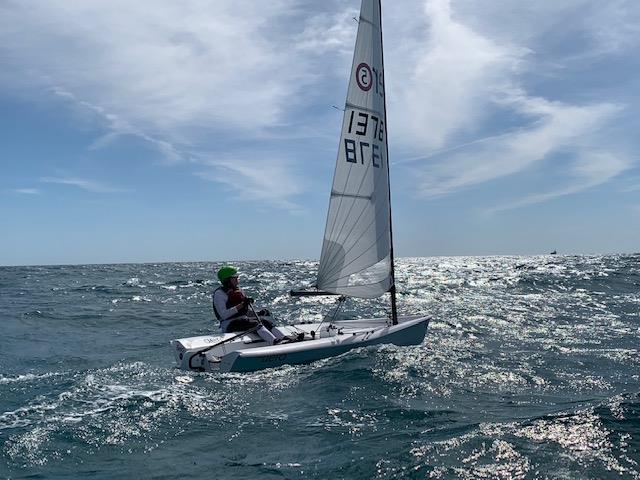
An interview with Paul Gingras about the RS Aero Midwinter Regatta
by David Schmidt 4 Feb 2019 08:00 PST
February 9-10, 2019

An RS Aero sailing off of the Palm Beach Sailing Club © Paul Gingras
Boat designer Bruce Kirby snapped heads in 1969 with his one-person Laser, a sailboat that went on to become one of the most popular designs of all time. While it’s tough to find hard words to say about this venerable design (aside from catching the mainsheet on a stern quarter when gybing through deep angles), the unvarnished truth is that the mighty Laser is starting to show its age a bit, especially when studied on a dock next to newer, faster designs such as the RS Aero, a carbon-fiber rocketship designed by Jo Richards that has steadily served as a brain drain for the Laser class since it’s production began in 2014.
Featuring a carbon-fiber hull, a square-topped mainsail that comes in three different sizes, hard chines, and an open transom, the RS Aero delivers big-grin fun to those who—much like aboard a Laser—are willing to hike hard on the uphill and downhill legs once the breeze pipes up.
Not surprisingly, these fast, planing-friendly boats lend themselves especially well to warm water venues, where the price for an over-zealous, breeze-on gybe is considerably less than in northern climes that are still dealing with cold rain and snow.
I checked in with Paul Gingras of the RS Aero Palm Beach Fleet, via email, ahead of class’ upcoming midwinter regatta (February 9-10, 2019), which is being co-hosted by the Palm Beach Sailing Club and the Sailfish Club of Florida on the waters off of West Palm Beach, to learn more about this athletic-sounding event.
How many boats are you expecting on the starting line? Also, are most of these sailors traveling to attend the regatta or will most competitors be Florida-based?
We’re expecting 30 entries, and about one third of them come from Florida, the rest from all over the country and [over] the last two years a few from England.
What kinds of competition levels can attending sailors expect? Also, have these levels been rising as sailors gain experience with the boats, or have competition levels always been a situation of guns blazing?
We have a full range of levels, from first timers in chartered boats to a world champion.
This is the third year for our regatta and, yes, the sailors have become more familiar with the boats and the level of competition has risen but is not “killer” racing as in some Laser fleets.
Weather-wise, typically, what kinds of conditions can be expected? Also, what would be the best-case and worst-case weather outcomes?
Typically the temps are [in the] mid-70’s, winds 10-15 knots from any direction and water temps around 76 degrees.
Best case: 12-18 knots from the southeast out on the ocean. Worst case: last year we had a day with 25-34 [knots] from the east, which kept us on the beach, [which was] very unusual.
Provided that the weather gods cooperate, how many races do you and the other event organizers hope to score? Also, will these be Windward-Leeward races, or will you employ other shapes as well?
Eight races. We only use W-L courses in light air. The Aero is a small skiff and loves to plane and surf, so we usually have plenty of reaching legs.
I note that the NOR advises that racing will either take place on the Atlantic Ocean or on Lake Worth…what factors would tip the scale in favor of one venue over the other? And does local knowledge play a bigger role at one venue over the other?
Strong easterly winds would create difficult conditions exiting the Palm Beach inlet so [in those situations] racing would be held on Lake Worth (Intracoastal Waterway).
There are tidal currents on Lake Worth and ocean currents along the edge of the Gulf Stream offshore. Pay attention to those and then local knowledge does not factor in.
What kinds of evening/on-shore entertainment can visiting sailors look forward to at the event?
Friday evening, following a practice day and clinic, there [will be] heavy hors d’ oeuvres and a famous rum punch served by the Sailfish Club of Florida, and on Saturday dinner is hosted by the Palm Beach Sailing Club and ranges from Cuban cuisine to a gourmet food truck.
Can you tell us about any steps that you and the other event organizers have taken in the last couple years to help green-up the regatta or otherwise lower its environmental wake?
We have reduced the amount of printed-paper and we don’t use disposable water bottles. All sailors are given reusable bottles to stow in their cockpits, and they can exchange them for a full bottle between races.
No trash of any sort is allowed in the water or on the beach.
Anything else that you’d like to add, for the record?
This is the only RS Aero regatta in the U.S. with the opportunity to race in awesome offshore conditions— wind, waves, and warm water.